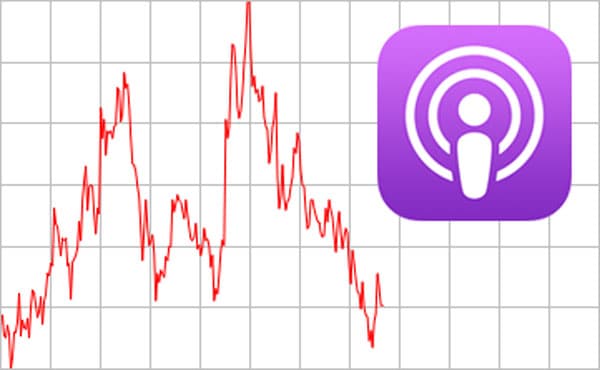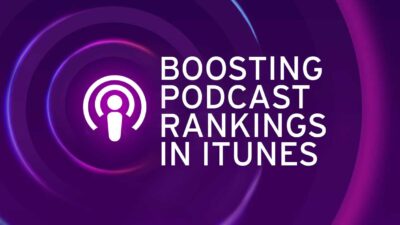Table of Contents[Hide][Show]
- 01) Research Your SEO Keywords
- 02) Great Artwork
- 03) Short Descriptive Episode Titles
- 04) Individual Episode Descriptions
- 05) Single Topic Shows
- 06) Promote Podcast Subscriptions
- 07) Ask For iTunes Reviews
- 08) Got Video?
- 09) Create Download Spikes!
- 10) Encourage Your Audience to Use iTunes
- 11) The Age of Your Podcast Matters
- 12) Have an 8 Week Plan
- 13) Publish Regularly
- Good Luck with Your Podcast SEO Efforts!
Nothing is worse than spending a lot of hard work and time making a podcast that doesn’t get the attention it deserves. Apple doesn’t disclose exactly how they calculate their podcast rankings for iTunes. However we can make some educated guesses based on multiple podcasters that have experimented and shared their success stories online. The following tips will help boost your podcast SEO by helping audiences find your podcast content on iTunes, increase your podcast ranking and create additional opportunities for discovery, downloads and subscriptions.
01) Research Your SEO Keywords
iTunes allows 12 keywords per podcast episode. Take advantage of this SEO opportunity. Research important keywords and phrases that you should be using in the metadata for both your podcast show description and for each episode. Sites like Keywordtool.io and Uber Suggest are great places to start.
Don’t worry about long-tail keywords. iTunes users don’t enter lengthy searches into the program when searching for podcasts. Think about one or two word phrases and include keywords like famous names, movie titles, characters, companies, associated projects, etc. Taking the time to add a few keywords will quickly boost your podcast SEO.
02) Great Artwork
Spend some extra time on the album artwork for your podcast. Not only will it help attract users, but rumor has it, they contributes to your podcast ranking. Allegedly one of the factors that iTunes uses to determine if a podcast is popular is clicks. So the more clicks your podcast gets, the better.
If you have the time, it’s a great idea to create specific artwork for each episode. This will really help your content get noticed. You don’t even need a large budget. Services like Fiverr even have designers that can make podcast artwork for you for only $5.
03) Short Descriptive Episode Titles
Keep your episode titles short and sweet. Often times, only the first 4-5 words will be shown in previews and search results. Limit the characters in your titles and try to be descriptive.
Don’t waste your title field characters with episode numbers and dates. If you insist on including episode numbers and recording dates in your metadata, then add them at the end of your title or descriptions, not at the beginning. Otherwise you’re wasting the few characters that iTunes users will see when they search for your content.
04) Individual Episode Descriptions
Don’t use your generic show description as your episode descriptions. Instead, describe in detail each episode, the participants and what was discussed.
Remember the famous line from the movie Field of Dreams “If you build it, they will come”? If you record a podcast will your audience find it? Not necessarily. Use your researched target keywords (see above) to help you with your description. The better your description, the more likely your content will be found.
I always feel sorry for podcasters when I only see the same generic show descriptions for each episode. They are spending countless hours creating episodes that are basically invisible to search engines and potential audiences.
05) Single Topic Shows
Don’t cram too many topics into one show. The days of the rambling podcaster are over. Modern audiences prefer their content short and sweet. Sure there’s room for long-form podcast content, but instead of making one big show with lots of topics, consider covering the same amount of material but cutting it up into creating 2-3 episodes. Here’s why…
- Gives you more room to write your metadata (keywords, titles and descriptions).
- Makes your show easier to listen to. The average American commute is 25 mins. Try to fit your show in that window.
- Makes your show more active and popular. The more episode downloads you get, the more popular iTunes will rank your show.
- Helps you understand better the types of content your audience enjoys.
06) Promote Podcast Subscriptions
Ask your audience to subscribe to your podcast. Once someone finds your podcast in iTunes, there are two ways for them to enjoy your show: download a single episode or subscribe. You want subscribers. iTunes places more value on subscribers and the better your ratio of subscribers vs episode sampling is, the better your show will rank.
Some tips on how to boost subscribers:
- Remind your audience: Verbally remind your audience to subscribe at the end of each episode. Thank them for listening/watching and ask them to subscribe if they haven’t already.
- Use social media: After you publish your podcast, share links to the new episode on all of your social media channels.
- Blog: Organize all of your show notes and post it on your website. Each episode should have its own blog post. Include both an embedded version of your podcast episode in the post and a link where people can subscribe.
07) Ask For iTunes Reviews
Remind and reward your audience for reviewing your show on iTunes. iTunes uses review data for determining your search results. Higher reviewed podcasts get better rankings.
You can encourage reviews by mentioning reviewers in your show and by offering to give away prizes to people who take the time to leave reviews.
08) Got Video?
iTunes gives video podcasts a higher search ranking. If you have the capabilities to produce video episodes, definitely start thinking about it. The default iTunes podcast search is for “All” or both Audio and Video.
09) Create Download Spikes!
Got an exclusive or a show that you know will be a hit? Try to create a traffic spike. When iTunes sees a spike in downloads, they know your content is popular and will rank it higher in search results.

On special occasions, plan on going above and beyond to promote specific episodes to create a traffic spike. You can promote episodes to targeted audiences using social advertising like promoted tweets and Facebook ads. Spending even $50 or under per episode will make a huge difference.
10) Encourage Your Audience to Use iTunes
If you can, try to drive your audience to iTunes. There are thousands of great podcast apps and services on the market like Overcast, Libsyn and Podbean. But the most popular podcast aggregator is iTunes. The more people you have searching, clicking and subscribing to your podcast on iTunes, the better your iTunes search ranking will be.
11) The Age of Your Podcast Matters
When it comes to podcasts, age matters. The older your podcast, the more authority and the better search placement it will have. So if you have a great idea for a podcast but have been waiting before publishing, then stop procrastinating and try to publish as soon as possible. However, make sure you have an 8 week plan… (see next item).
12) Have an 8 Week Plan
All new podcasts should have a strong 8 week plan. If you have a new podcast, keep in mind that the moment you submit it to iTunes, you start your “New and Noteworthy” clock. The “New and Noteworthy” podcast section on iTunes only features new podcasts 8 weeks old and under. Getting featured in this section is extremely important and can result in massive downloads and subscribers.
Some tactics you might consider adding to your 8 week plan might include:
- Guest appearances on other podcasts
- A multi-part series that keeps your audience hooked through multiple episodes
- Planned advertising budget for each episode
- Pre-record multiple episodes before your submit your show to iTunes
- Establishing an audience using a blog and social media before you start podcasting
13) Publish Regularly
Pick a publishing schedule and stick to it. Many podcasters will record several shows at a time. But don’t publish them all at once, space them out.
You don’t have to publish your episodes at the same exact time every day/week, but you should try to be consistent in how often you release. Shows with a regular release schedule get better iTunes rankings.
Good Luck with Your Podcast SEO Efforts!
Unfortunately Apple doesn’t publicly disclose how they rank podcasts and is constantly making updates to the iTunes algorithm. But the tips in this article come with good authority from various podcasters and personal experience.
Please leave a comment below if you have additional tips or disagree with any of the tips listed above. Thanks.

Frank Wilson is a retired teacher with over 30 years of combined experience in the education, small business technology, and real estate business. He now blogs as a hobby and spends most days tinkering with old computers. Wilson is passionate about tech, enjoys fishing, and loves drinking beer.












 This Dog is a Better Pac-Man Player Than You
This Dog is a Better Pac-Man Player Than You
Great ideas on gaming your podcast SEO! Do you have more tips for sports shows?